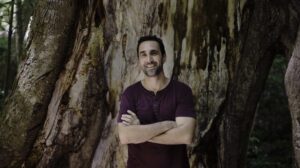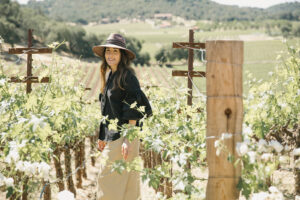
Masaya Co — Sustainable Furniture from Seed to Seat
MasayaCo is a sustainable furniture company on a mission to combat climate change through reforestation & sustainable design.
Africa
Julia Gordon August 15, 2024
The Rockefeller Foundation, established in 1913, stands as the second-oldest major philanthropic institution in the United States. Founded by John D. Rockefeller, the wealthiest American of his time, the foundation was conceived with a mission to use his vast fortune to create lasting and impactful philanthropy for the betterment of humanity. For more than a century, the Rockefeller Foundation has been at the forefront of driving progress in key areas such as public health, food security, energy, and finance. Grounded in rigorous science and data, the foundation’s work has led to significant advancements in eliminating disease, promoting equity, ending energy poverty, and ensuring global nutrition.
A key figure in this ongoing mission is Betty Kibaara, the Director of Food Initiatives at the Rockefeller Foundation’s Africa Region Office. With a career dedicated to transforming food systems in Africa, Kibaara began her journey as a numerator, where she discovered the potential for meaningful change through research. Her role at the foundation has since seen her spearheading initiatives to reduce food waste, enhance school feeding programs, and promote insect-based feed to boost nutritional outcomes. In her words, “My hope is that every child has access to hot meals.”
We recently had the opportunity to sit down with Betty to delve into her role at the Rockefeller Foundation, explore her deep-seated passion for agriculture and nutrition, and learn more about her interests beyond her professional work.
Mood of Living: Where did you grow up? What was your childhood like?
Betty Kibaara: I grew up in Kenya, in Murang’a County. I was the firstborn in a family of three girls. That’s where I lived for about 13 years. My mother worked as a clerk in a Tea Factory and unfortunately, when she lost her job, we had to relocate to a family farm in Embu County, Kenya.
MoL: Where do you live now?
BK: Right now, I live in Nairobi. I also have a farm in Eastern Kenya where I occasionally go.
MoL: What motivated you to pursue your studies in agriculture, food systems, and economics?
BK: My passion for agriculture and transforming food systems sparked from my upbringing. My late mother was a smallholder farmer. In the village, you had to help on the farm. I saw my mom grow almost all her crops. Now, I have my garden where I grow almost all of my food. In a nutshell, when I was growing up in the village, I saw my mother face so many challenges, whether this was a lack of input, rain, or a lack of financing. So, I wanted to do something in agriculture to empower my parents, myself, and the community around me.
My first Degree was in Agribusiness Management from Egerton University and my master’s degree was in Agriculture and Resource Economics from Colorado State University in USA. I got a distinguished alumni award in 2022 in New York with the African American Institute. That was a very big highlight for me.
MoL: After you got your degrees, what was your path to getting to the Rockefeller Foundation?
BK: I got my first job during my graduation day. A Research Fellow at Tegemeo Institute, Egerton University came to the graduation square and asked all of us, ‘Who is interested in doing research and working as an Enumerator?’ And I was like, ‘Whatever this is, okay, I’m gonna take it!’ In a month’s time I was interviewed, and I managed to get it and that was the beginning of my professional career in agriculture and food system transformation.
I started as a numerator, collecting primary farm-level panel data at Tegemeo Institute of Agricultural Policy and Development, which was part of Egerton University where I went to school. We collected and analyzed agriculture and farm-level data for the USAID, World Bank, Governments, and others. So, I spent a lot of my earlier days doing analyses, a lot of research in the field, and interacting with farmers, stakeholders, and policymakers. It helped me understand the agriculture sector.
While at Tegemeo Institute, I was engaged as a consultant for The Rockefeller Foundation. There was one project we did in Western Kenya where we were evaluating a project on Cereal e-banking. I really liked the way The Rockefeller Foundation program team was asking us tough but strategic questions. I started admiring the work of the Rockefeller Foundation. I said ‘Okay, if I can work with The Rockefeller Foundation, I can go beyond research and have the resources to do the things that need to be done.’ That was the motivation: being able to do research but also joining a foundation that has funding and resources to solve pressing problems.
Betty Kibaara
MoL: Can you tell us about your role as Director of Food Initiatives?
BK: At The Rockefeller Foundation Food Team, I contribute toward shaping solutions to development challenges. I’m involved in strategy development and shaping of the Foundation’s vision. I’m also involved in partnership-building and management of grantees.
MoL: How do you determine what kind of initiatives you want to lead and what areas you want to work in?
BK: The Foundation tries to work in areas where we can use our philanthropic capital to make a difference, and in most cases, in new areas. We are driven by science and collaboration, and we want to tackle global challenges through market systems development.
Just a few years ago, we identified one of the biggest problems as access to renewable energy. The Rockefeller Foundation then partnered with the Ikea Foundation and the Bezos Earth Fund, and established an organization known as Global Energy Alliance for People and Planet that focuses on improving access to electricity in different countries. The Foundation has also established AGRA to support food system transformation in Africa.
MoL: What are you focusing on right now?
BK: The work that I’m doing surrounds Africa’s food systems transformation. I’m working with school feeding programs. This is one of our flagship initiatives whose goal is to ensure that an additional 100 million children in Africa have access to hot and nutritious meals by 2030. We work with governments to help them to explore innovative financial mechanisms for school feeding programs to ensure sustainability. We also work to help them consider local sourcing. A lot of these foods are imported, and we want them to be locally produced.
We also try to scale innovation, and one innovation that I personally have been a champion for is work around insects like the Black Soldier Fly. We can harvest the larvae and extract sufficient protein — equivalent to that of pelagic fish or soya beans. Black Soldier Fly converts the organic waste into organic fertilizer known as frass which is used in regenerating and nourishing soils. We were partnering with, the International Centre of Insect Physiology and Ecology (ICIPE) to scale the BSF innovations across the African Continent and commercialize the BSF technology from the Lab to the land. Five years down the line, with very little investment, we have helped to shape the insect-based feed sector in Africa. We are currently partnering with the African Organization for Standardization to harmonize standards for Insect production in Africa.
MoL: What are some of the main issues impacting food security across Africa?
BK: The biggest challenge we have right now in Africa is climate change. We are seeing more negative impacts of climate change, whether these are droughts or floods, like in Kenya for the last two months. They had to delay the schools’ opening because of the floods. When it’s not flooding, unpredictable rainfall patterns have really disrupted yields. So that’s one big challenge, the whole issue of climate and not being able to predict what is going to happen.
The other thing is about financing. Many smallholder farmers don’t have access to financial services. They need to purchase improved inputs; they need better technology and to develop their own infrastructure. Only 7% of the funding for small-scale agriculture actually goes to small and medium-scale farmers. So, a lot of investment is required.
Also, limited infrastructure. I know some places in Central Kenya where they harvest potatoes, but the bad roads do not allow them to transport their goods to market. When the harvest is done, they don’t have enough storage facilities. Even irrigation systems have become a challenge. So, it’s a number of things.
MoL: What kind of work are you doing in schools and why is it so important?
BK: I am part of the food team that is supporting investments in school feeding programs in Africa. The reason why school feeding programs are important is that in some cases, it could be the only full meal that a child eats in a day. There are about 418 million children who are on school feeding programs, and that is a bump up from about 388 million children before COVID-19. So, we are seeing governments increasing their investments in school feeding programs.
There are also other core benefits of school meal programs such as reducing malnutrition. School feeding programs actually reduce malnutrition by about 15%. And then in terms of human capital development, because children are now able to concentrate more in school, programs also increase attendance by about 9% and reduce dropouts by about another 8%.
School meal programs also contribute to local economies. For example, many farmers benefit from structured institutional procurement. The biggest challenge for the smallholder farmers in Africa is the lack of access to structured markets, and then in terms of local investment, there have been assessments that show that $1 invested in school meals generates about $9 in return.
At the global level, we work with the Global School Meals Coalition where over 99 countries have committed to increasing access to school meals. For example, we supported the Government of Kenya to develop a roadmap for universal school meals program.
We are also trying to support them in transitioning their diet because when we juxtapose the non-communicable diseases and the food that we are eating, we see that there is some correlation. When you walk into a supermarket, a lot of the food is processed. Even maize flour is over-processed. So, what are we eating? We are just eating white stuff that doesn’t have a lot of nutrients. One of the things we’ve been doing is working with companies to shift from highly sifted flour to fortified whole grain. And then also trying to support home-grown school feeding programs where the children are eating locally available food.
School feeding program.
MoL: How do you collaborate across teams at the Rockefeller Foundation?
BK: We collaborate a lot with our communication team, health, power and our innovative finance team. For example, we are now looking at how to finance regenerative agriculture. One of the things that we have been interested in doing is innovative finance for school feeding programs.
We are also now a climate foundation, so a lot of the work we are doing is just making sure that there is a climate angle. We are making investments to support schools to transition to clean cooking and reduce environmental damage though cutting of trees for use as firewood.
MoL: Where do you hope to see the future of your work?
BK: The Rockefeller Foundation is in the process of developing its scaling strategy in partnership with other stakeholders to expand the school feeding programs to cover at least 100M more learners with a hot meal a day.
For me, I hope to see that every child has access to hot meals. In March this year, I attended the Africa Day for School Feeding in Burundi. I was speaking on a panel and there was someone who presented to us pictures of the brain of a malnourished child and the brain of a normal child. The brain of a malnourished child was small while the brain of a child who was not malnourished was normal-sized. That picture is embedded in my mind, and it made me sad. What does a future generation look like if half of our children do not have enough food to eat? It means we are reducing the cognitive ability of the future generation to optimize their potential.
MoL: What advice do you have for the next generation of young people who want to pursue careers that make a difference?
BK: It should be less about money and more about passion. They need to identify the global issues that really ignite their passion, be it in climate, be it in food, be it in IT, or whatever they pursue. When you are working with a passion, it’s not just about the paycheck but it’s about you filling the potential in your life.
The second one I would say is to find a niche. I see these days young people jump from here to here. Identify that niche and become an innovator and a champion in that space.
A lot of young people will navigate their professional careers without a mentor. I am a product of mentorship. I have had a number of mentors: my mother and my mom’s sister, my auntie, who started mentoring me from 13 years old. She was the first graduate that I ever saw in our village, and when I saw her wearing her graduation gown, I became curious, and I wanted to graduate one day – And I did! Along the way, I have also had a professional mentor who taught me how to navigate the professional landscape. I always say a mentor is someone who sees your potential when you cannot even see it in yourself. But a lot of young people are navigating the professional world without a mentor. Look at my LinkedIn page; I describe myself as a mentor, a coach, and then a farmer, and then the Director title comes toward the end because it’s not what drives me. It’s the passion inside me.
I also do a mentorship program at The Rockefeller Foundation. I am in charge of the interns and at any given time I have two interns. What I like about them is we pick the ones who would be very unlikely to work at the foundation. I am always inspired to see their professional growth after the internship program.
MoL: Is there anything that we didn’t ask you that you wish we had asked about?
BK: I believe that for you to be successful in your professional career, it’s not just about work, it’s also about what happens away from work. I am very passionate about gardening. My garden is just amazing. So, what you perhaps didn’t ask is, what are the other things I do outside the Rockefeller Foundation, that are not complete without the other part. I have a garden, it’s called Hidden Treasure Garden, and it has more than 250 varieties of flowers.
I also do farming. I am trying to make a case because when I look at smallholder farmers, I don’t see their lifestyles improving. I am convinced that I need to focus on tree crops. So, I am doing a lot of work around tree crop farming. I am doing apples, plantain, avocados, and dragon fruit farming because I want my farm to be a demonstration center for other farmers to learn from.
The final skill that keeps me busy is crocheting. I make sweaters, shoes, make mats — I can make almost anything. What I can also tell the young generation is that it’s not just about the professional career, it has to be what you do during your private time so that when you come to work on Monday, you come with a lot of renewed energy.
Photography courtesy of Rockefeller Foundation

MasayaCo is a sustainable furniture company on a mission to combat climate change through reforestation & sustainable design.

Founded in 2013 by Melati and her sister Isabel at 10 and 12 years old, their NGO encourages people to stop using plastic bags.

April Gargiulo founded the sustainable skincare brand Vintner’s Daughter on principles of efficacy and sustainability.